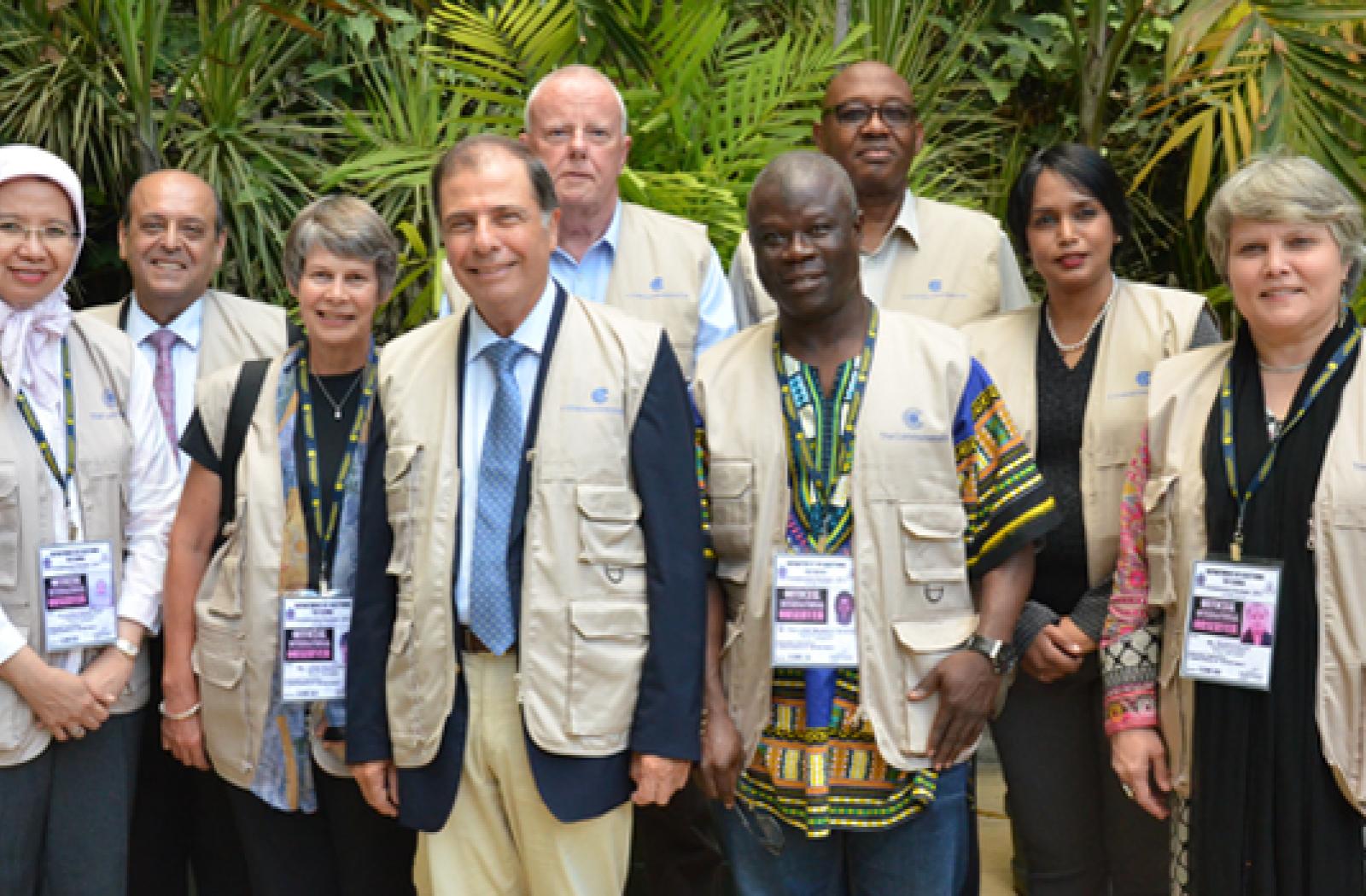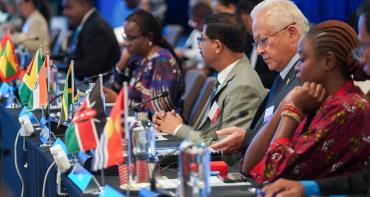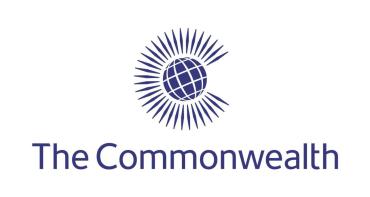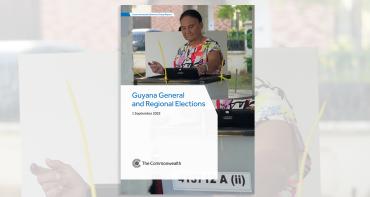An independent Commonwealth Observer Group was invited by the Office of the Commissioner of Elections of Sri Lanka to observe the country’s parliamentary elections on 17 August 2015.

An independent Commonwealth Observer Group was invited by the Office of the Commissioner of Elections of Sri Lanka to observe the country’s parliamentary elections on 17 August 2015.
The nine-person observer team, selected by Commonwealth Secretary-General Kamalesh Sharma, was led by former President of Malta Dr George Abela as Chairperson.
At a press conference in Colombo on 19 August, Dr Abela issued the following statement:
Members of the Commonwealth Observer Group have been in Sri Lanka since 2 August 2015. Our mandate has been to observe all aspects of the electoral process pertaining to the 17 August 2015 Parliamentary Elections, in order to assess compliance with the standards for democratic elections to which Sri Lanka has committed itself.
The Statement that I make today sets out our preliminary observations in this regard. Our Final Report will be issued at a later stage, which will contain our detailed findings and recommendations for future elections.
Since the full Commonwealth Observer Group arrived in Sri Lanka on 10 August, we have met with the President of the Republic, the Commissioner of Elections, the main political parties and alliances, the police, citizen observer groups, civil society, legal experts, media practitioners and monitors, other international observers, the United Nations Resident Coordinator and Commonwealth High Commissioners.
Prior to election day, observers witnessed campaign activities in the Western, Eastern and Southern provinces. On election day, we had observers present in the Western, North Western, Northern, North Central and Central provinces. In these areas we witnessed the opening of polls, voting, the closing of polls and the counting process.
These have been pivotal elections in Sri Lanka, coming less than eight months after a Presidential election in January, which saw a change of President and the formation of a minority-led national government.
These elections also followed shortly after the passage of the 19th Amendment to the Constitution, which, among other things, reduced some of the powers of the Executive President; strengthened those of the Prime Minister; reduced the term of Parliament from six to five years; and set up the Constitutional Council which will strengthen the independence of the Elections Commission, the National Police Commission, the Human Rights Commission and other institutions.
This revived Constitutional Council has had one meeting since the 19th Amendment to the Constitution was passed in April 2015. At this meeting the Council did not appoint members to independent institutions, including members of the envisaged Election Commission. Accordingly the Commissioner of Elections, in office before the 19th Amendment, continued to perform the functions of Commissioner of Elections for the purposes of these Parliamentary Elections.
Key Findings
Legal and Institutional Framework
- There is a need to promulgate a revised, consolidated Constitution that clearly demarcates constitutional powers and duties, particularly during election time, and to review the electoral system.
- An independent Election Commission, as outlined in the current Constitution, must be established as a matter of urgency. The Group notes that a number of previous Commonwealth Observer Groups have made this same observation.
- The Group notes that less than 10% of nominated candidates in this election were women. Serious consideration must be given to affirmative legal measures to ensure adequate participation and representation of women in politics at the national level.
- In our view, overly restrictive provisions related to campaigning methods need revision in order to facilitate the campaigns of candidates. When existing provisions are implemented to the extent witnessed during this election, print and electronic media are heavily relied on for campaign messaging. This puts candidates with more limited financial resources at a disadvantage.
- The law is silent on the issue of advance voting for those who are unable to come to the polling station owing to illness, infirmity or physical disability on election day, except listed public officials. This should be reviewed.
- There are currently no regulations on campaign spending or campaign financing. This merits consideration in light of best practice in election management.
Campaign Period
- It was encouraging for the Group that all stakeholders viewed this election environment as remarkably calmer and more peaceful than those witnessed in the recent past.
- The campaign environment was low-key, with a limited number of campaign-related visual materials on display. This was mainly due to the strict enforcement of election laws and guidelines. The Group observed small meetings and rallies during the campaign period.
- We note a number of reports of instances of misuse of state resources in election campaigning and are concerned by incidents of violence, including attacks on campaign offices, grievous assault and three election-related deaths.
- It is heartening to note that the Commissioner of Elections enjoys the confidence of all stakeholders. His role throughout the electoral process was prominent, and his directives received widespread media coverage. The Commissioner confirmed to us actions taken against those not in compliance with election laws and his directives. It was clear that the Commissioner was committed to a fair campaign environment.
- The proactive and even-handed approach of the police during the election campaign period is to be commended. An effective and trusted civilian law enforcement agency is a vital pre-requisite for a credible election.
- The media environment surrounding the election appeared to be, on the whole, fair to all those contesting. State media was reported to the Group as having some, but not considerable bias toward the incumbent political alliance. The media guidelines issued by the Commissioner of Elections, which established the ground rules for fair media reporting, were largely adhered to.
- As noted by previous Commonwealth Observer Groups, the active role of citizen observer groups in monitoring and reporting at all stages of the electoral process was impressive. Their work undoubtedly contributes to the country’s democratic culture.
Voting, Counting and Results Process
- The Group was impressed with the training of polling officials, the early deployment of polling staff, materials and police to polling stations ahead of polling day.
- Polling stations were laid out according to instructions from the Commissioner of Elections. There was adequate signage at polling stations in all official languages to guide voters. We note, however, that in some cases, the layout adopted and space constraints did not always guarantee that the secrecy of the ballot was adequately provided for.
- Voters were able to exercise their franchise freely in a peaceful environment. The turnout was relatively high, with the majority of voters turning out in the first half of polling day. Voters on the register of electors with the required identity documents were able to vote.
- Election officials managed the entire polling process efficiently and transparently, and we commend them for this.
- The police were positive and visible in maintaining security at polling and counting stations and in ensuring that violations of election law were kept in check.
- Vote and preference counting was conducted transparently, during which counting officials worked diligently. The presence of polling agents and citizen observers at this crucial stage of the electoral process further enhanced the transparency of the count.
- Officially declared results were swiftly relayed to the media and to the public.
In view of the overall fairness of the campaign environment, the robust and even-handed approach of key institutions and the transparency with which voting, the count and results process took place, the Group concludes that this election was credible, met the key criteria for democratic elections, and that the outcome reflected the will of the people of Sri Lanka.
Over the next three days, we will complete our Final Report for onward transmittal to the Commonwealth Secretary-General. The Secretary-General will in turn submit it to the Government of Sri Lanka, the Office of the Commissioner of Elections, and political parties. Eventually it will be sent to all Commonwealth governments, and then made public via the Commonwealth website.
It has been a special honour and privilege to have been invited to Sri Lanka to observe this election and, on behalf of the Group, I wish all Sri Lankans well.



